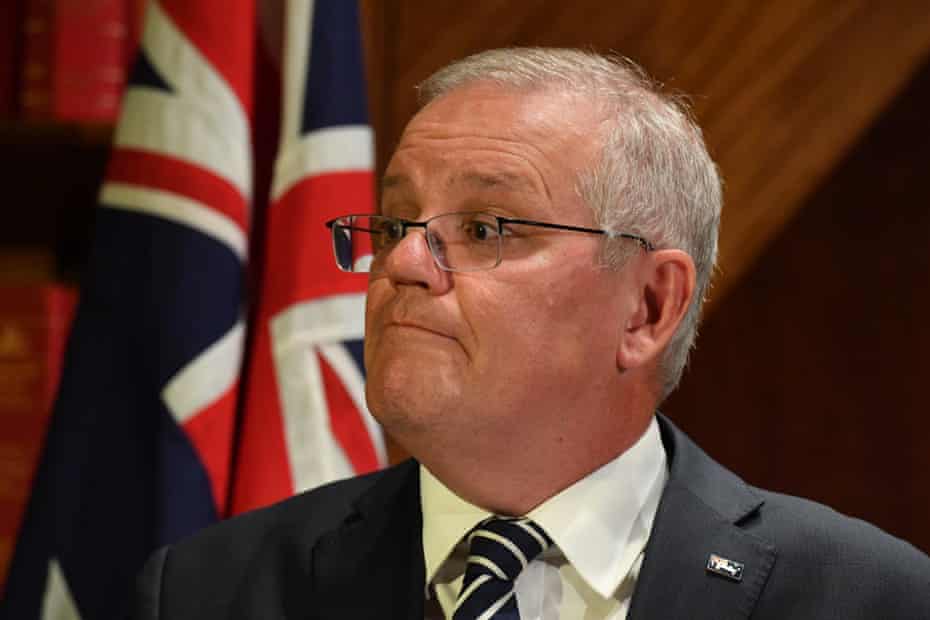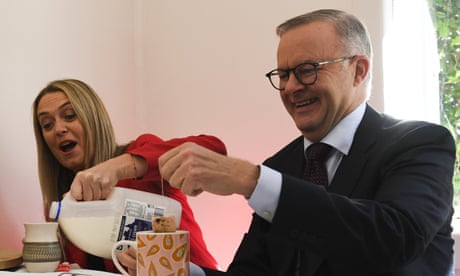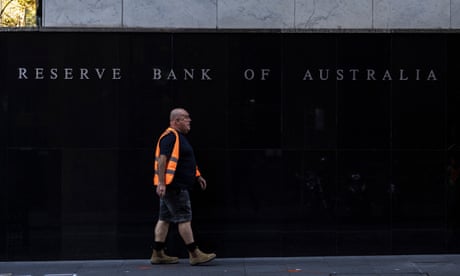Extract from The Guardian
Scott Morrison says Reserve Bank has ‘made a very important statement about where we are now in our journey out of this pandemic’
- Follow our Australia news live blog for the latest updates
- Read our latest election briefing and listen to today’s campaign catchup podcast
- Election 2022 seat explorer; Pork-o-meter election promises tracker
- Guardian Australia’s full federal election coverage
- Get our free news app; get our morning email briefing

Tue 3 May 2022 19.14 AEST
Last modified on Tue 3 May 2022 19.30 AESTFollowing the bank’s decision to lift the official rate from a record low 0.1% to 0.35%, the opposition treasury spokesman, Jim Chalmers, said on Tuesday afternoon that Morrison had overseen a “triple whammy” of cost of living pressures: higher interest rates, soaring inflation and stagnant wage growth.
“This is a full-blown cost of living crisis on Scott Morrison’s watch and now interest rate rises are about to be part of the pain,” Chalmers said. “This is a crisis. Families who were already finding it hard enough to get ahead – now they are finding it that much harder.”
The Reserve Bank governor, Phillip Lowe, said the rate hike was needed to address rising inflation. He said it was “the right time to begin withdrawing some of the extraordinary monetary support that was put in place to help the Australian economy during the pandemic”.

“The economy has proven to be resilient and inflation has picked up more quickly, and to a higher level, than was expected,” he said. “There is also evidence that wages growth is picking up. Given this, and the very low level of interest rates, it is appropriate to start the process of normalising monetary conditions.”
Lowe flagged further rate increases to reduce inflation further with hopes the latter would moderate at about 3% by 2024.
The lift in the market interest rate was the first increase since 2010 and the first rate hike during a campaign since 2007 when John Howard lost office to Kevin Rudd.
At that time, the cash rate was raised 25 basis points to 6.75%, prompting Howard to apologise to voters for the additional “burden” being faced by households.
“I sympathise with Australians as they face higher cost of living pressures,” he said. “I sympathise with Australians when they face higher repayments on their homes, of course I do, and that’s why we’ve provided the relief in the budget that is the function of our strong economic plan.”
Morrison said “Australia’s economic policy shield” had protected voters from financial pain during the pandemic and he pointed to Australia’s low jobless rate as the most important factor to ensure people were able to continue paying their mortgages.
“You know what banks look at most of all when they’re assessing someone for a home loan?” he said. “A job.”
Morrison said on Tuesday the Reserve Bank had “made a very important statement about where we are now in our journey out of this pandemic”.
“Australians have been preparing for this for some time. Throughout the course of the pandemic, we have seen them double their buffers on their mortgages and we have seen them move from variable rates to fixed rates,” he said.
But Chalmers said Morrison needed to take responsibility for the economic hardship the rate rise would cause. He suggested the government had spent too much on pandemic stimulus which had contributed to high inflation.
“The only shield that Scott Morrison is interested in is to shield himself from the blame and to shield himself from people who are doing it tough,” he said. “If only you could pay your mortgage with Scott Morrison’s excuses.”
“It’s about easing the cost of living. It’s about getting real wages growing again and it’s about having something to show for a budget which is absolutely heaving with a trillion dollars in Liberal and National debt.”
With less than three weeks left of the election campaign, Chalmers said the rate increase had crystallised the choice facing voters.
“This election is a contest between a Labor party with a plan for a stronger economy and a better future, versus a Liberal party promising nothing but three more years of the same falling real wages, the same skyrocketing cost of living and the same pressure on families which is making it harder and harder for them to get ahead,” Chalmers said.

Morrison used the decision to pivot back to the Coalition’s key campaign message on risk – saying the uncertain economic environment was a reason to stick with the government.
“At a time like this, as we get close to this election, why risk it? Why go in another direction? Now is not the time to turn back,” the prime minister said.
The government has been on the back foot over its handling of the economy with last week’s inflation figures coming in higher than expected.
Morrison has been pointing to the war in Ukraine and supply pressures out of locked-down China as the largest contributing factors and has defended the temporary nature of the cost of living measures included in the March budget that Labor has attacked as a short-term fix.
The Coalition is seen to have a traditional advantage on the question of economic management but a Guardian Essential poll has found Labor is viewed as better trusted to manage cost of living pressures.

No comments:
Post a Comment